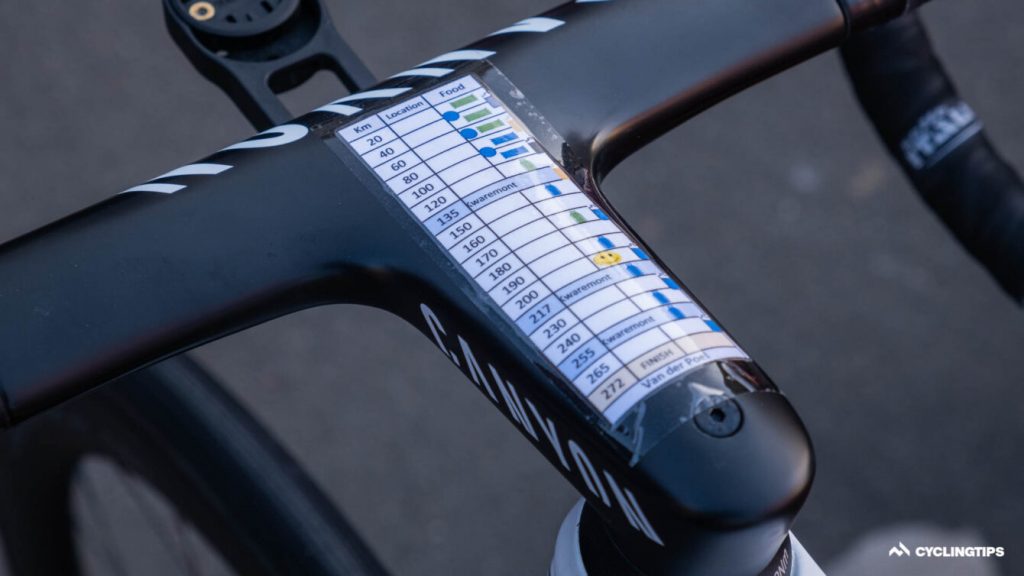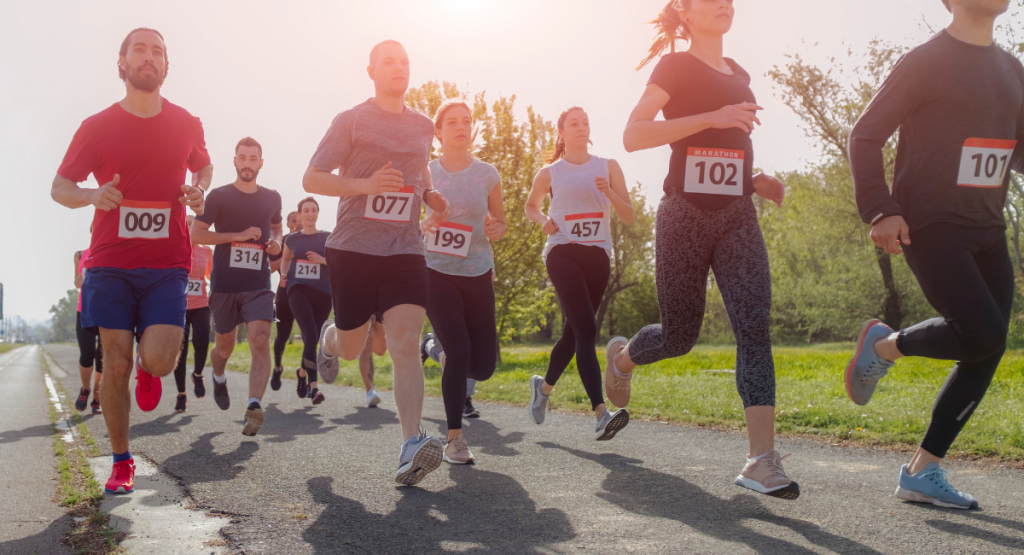Il Carbohydrate consumption during endurance competitions has always been a crucial issue in sports nutrition, but recent developments and studies have begun to shift traditional paradigms.
Elite athletes are now pushing the limits orbeyond the threshold of 90 grams of carbohydrates per hour, once considered the recommended maximum.
But does this behavior really lead to improvements in performance? Let's find out together!
Index
The story of the cyclist Mathieu Van Der Poel
After the 2022 Tour of Flanders, a photo showing a detailed meal plan attached to the handlebars of the race winner, Mathieu Van der Poel, went viral on social media.
Some rough calculations suggested that the Dutch cyclist had ingested over 100 grams of carbohydrates per hour during the 257 km race, completed in just over six hours – an extraordinary digestive feat, considering that conventional sports nutrition guidelines dictate taking in around 90 grams per hour.

Initially, Van der Poel's massive carbohydrate intake seemed like an isolated case.
However, Over the past couple of years, high carbohydrate intake has become an emerging trend among elite endurance athletes.
Recent studies suggest that it is possible consume up to 120 grams of carbohydrates per hour, and some professionals take even larger quantities.
It still remains to be seen whether this leads to an actual improvement in performance.
Carbohydrate intake and performance
The latest study to explore this topic was published in January 2024, in Journal of Applied Physiology by a research team led by Robert Jacobs of the University of Colorado at Colorado Springs.
Using real data, Jacobs and his colleagues have simulated the physiological characteristics of elite marathon runners and calculated the amount of carbohydrates needed to complete a marathon in less than two hours.
If you are fit, well trained and have a proper carbohydrate load, you already start a marathon with a significant amount of carbohydrates stored as glycogen in your liver and muscles.
Le exact quantities vary based on several factors, including liver and leg size, but on average elite male marathon runners start with about 690 grams of glycogen, while women start with about 499 grams.
At first glance, this seems promising, as they calculate that to complete a marathon in under two hours, an average male marathon runner would need to consume around 612 grams of carbohydrates, while an average female would need around 528 grams.
However, it is important to consider that it is not possible to completely empty your glycogen tank during a marathon.
It is estimated that approximately 62% of stored glycogen can be used during a two-hour marathon, leaving a significant deficit that must be made up by ingesting more carbohydrates.

To reach a marathon goal in under two hours, Jacobs and his colleagues calculate that an average elite male marathon runner should get about 93 grams of carbohydrates per hour, while the average woman would need about 108 grams per hour.
These quantities significantly exceed the limit of 90 grams per hour suggested by current sports nutrition guidelines.
While these figures are interesting, it is important to note they represent a theoretical hypothesis that may not necessarily translate into real-world performance improvements.
Also because many factors influence the performance of endurance athletes, not just carbohydrate intake!
Carbohydrates and endurance
However, there are three arguments that support the idea of consuming high amounts of carbohydrates during physical exertion:
- Recent laboratory studies have shown that humans can burn more than 90 grams of carbohydrates per hour from external sources.
- The digestive system can adapt to the intake of high amounts of carbohydrates through targeted training.
- Many successful endurance athletes seem to exceed the limit of 90 grams of carbohydrates per hour.
Nevertheless, it is important to maintain a cautious approach.
While it is possible to absorb 120 grams of carbohydrates per hour, it is not guaranteed to lead to performance improvements.
Some studies suggest that high carbohydrate intake can even reduce the efficiency of fat burning, which could have a negative impact on performance.
In conclusion, although the idea of increasing carbohydrate intake during physical exertion is plausible, it is important to be aware that no one has conclusively proven that consuming more than 90 grams of carbohydrates per hour improves performance.
To resolve this question, further well-designed research is needed!
And how many carbohydrates do you consume before your physical performance? Let us know in the comments and remember to follow us on our telegram channel
SUBSCRIBE HERE TO THE TELEGRAM CHANNEL












